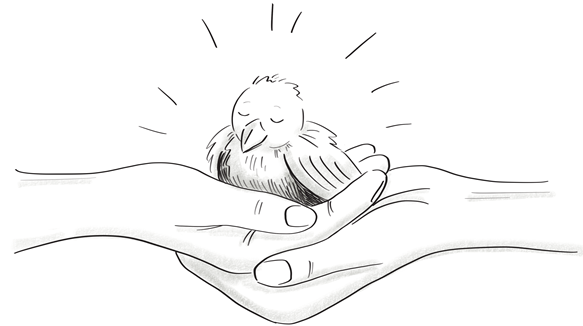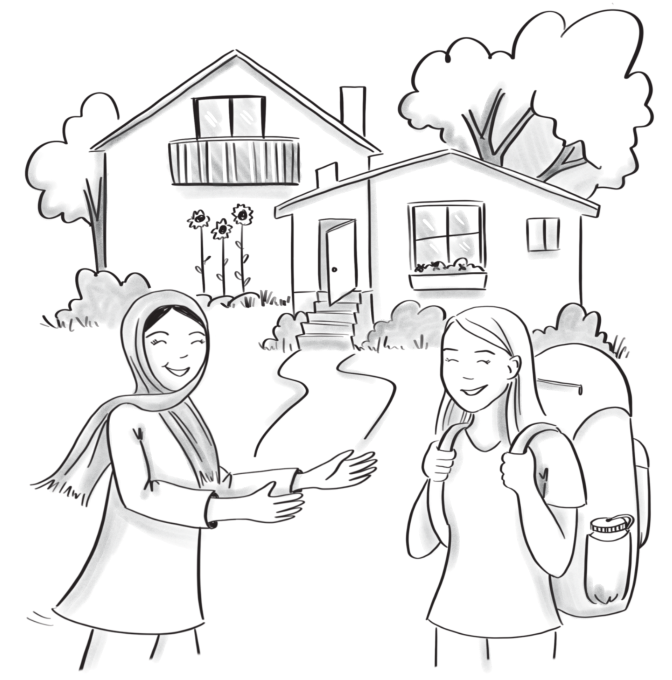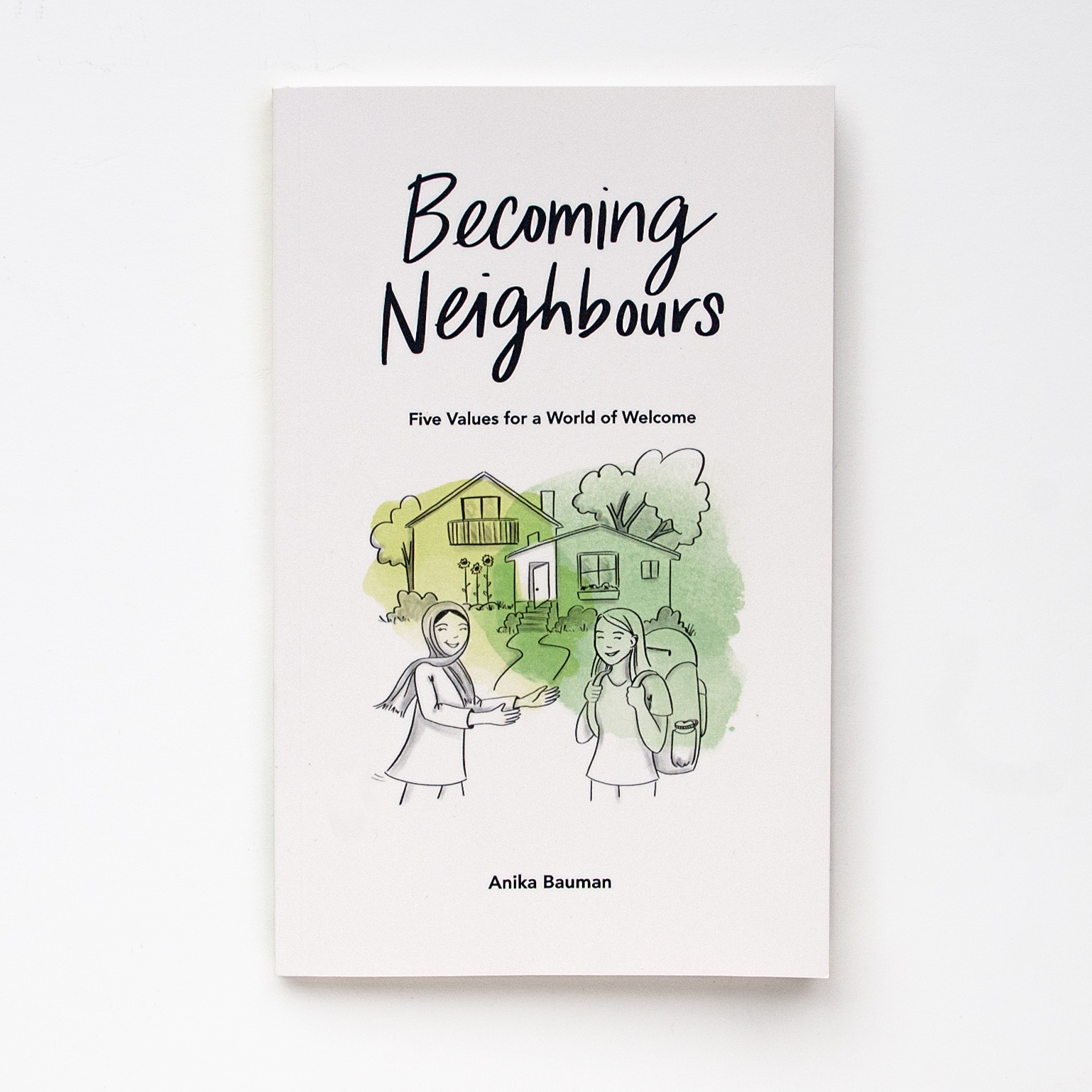“Mashallah, Miss Anika!”[1] Leila exclaimed as she stepped into the bathroom.* In the bathtub, six tiny chicks congregated under the heat of a red lamp hung from the shower rod. My hands cupped a warm, downy body—just days ago enclosed in a shell. Leila and her family, as well as the new brood of chicks, arrived at Kinbrace in the spring of 2019.[2] Leila hailed from Lebanon while the chicks came from Langley—a city in the Fraser Valley, just outside of Vancouver.
The evening Leila arrived, accompanied by her husband and daughter, I helped them carry their suitcases up the stairs and into their new apartment—an apartment which would be their home for the coming months as they got settled in Canada. “Thank you, Miss Anika,” said Leila, setting her bags down on the bunk bed. In their new home, the neighbors up and down the hall came from different countries but shared at least one thing in common: they were all seeking protection in this unfamiliar place.
The more I got to know Leila and her family, the less I heard “Miss Anika.” Before long I became, “My daughter!” “Come drink tea!” Leila would call whenever she saw me. A young, single woman from West Africa who lived across the hall was also adopted into the family, so Leila now had three daughters.
Summer came, along with a daily tradition. Six women from five countries—and a baby bouncing on someone’s knee—would gather in the backyard under the dappled shade of the locust tree and drink tea. As we shared stories and listened to one another, bonds began to form between us.
That summer ritual ended abruptly when a young mother was forced to make an agonizing decision: faced with the unknown timeline of her refugee claim and a crisis in her family, she had decided to return with her young child to their country of origin, leaving her husband in Canada. The evening of her departure, I stood on an upper balcony with Leila and my two honorary sisters. We waved to our friend as the car taking her to the airport drove down the alley and out of sight. Then, we cried together. My West African sister consoled us, and Leila ushered us in for tea. “Inside me it feels like the ocean,” she said as she filled my cup. With her limited English, she had articulated something immense. Below us, in the fading light of the backyard, the talkative hens grew quiet and returned to their roosts.

Mutual Transformation
We are diverse: striving to listen well, we learn and grow.
We are diverse
Mutual transformation, one of the core values of the Kinbrace community, is the fruit of welcome and trust. More than something we consciously practice, mutual transformation describes what happens when our relationships grow out of the rich soil of diversity. The Kinbrace community is made up of residents, hosts, staff, volunteers, financial supporters, neighbors, and friends. We speak many different languages, hold different passports, practice different religions, cook with different levels of spice, and sleep and wake at different hours. Amidst all this diversity, we share life together.
When our lives unfold in such close proximity, we will inevitably encounter our differences. When I first moved into the community, I was confronted with these differences in very tangible ways. I can remember making food for myself, only to find the leftovers I had planned to eat the next day disappear from the common fridge. But there were far more occasions when food would appear just as magically: Kurdish rice, Honduran tacos, Palestinian kibbeh, and Turkish poacha.[3] As my neighbors fed me like another member of the family, it took no time at all to learn that we were operating from different understandings of “mine” and “ours.”
Another stark contrast I encountered early on was our different perceptions of time. I often struggled to live “between worlds,” lingering for tea with my new neighbors while the clock ticked away on my ever-growing to-do list. These experiences of squirming in my seat while attempting to be present to the person in front of me were uncomfortable, but necessary. My discomfort continues to uncover the high value I place on productivity. If I’m paying attention, it forces me to recognize that my task-oriented ways of measuring a day are not the only metric for success. I know that every time I have slowed down simply to be with someone, that to-do list takes its rightful place—and I’m left wondering what could possibly be more urgent than presence.
When we choose to open ourselves to diversity—not just as observers, but as active participants in relationships—we will find that our worldview is called into question (along with the host of assumptions and blind spots that come with it). We may feel ourselves being invited to consider larger questions about our identity and how it impacts the way we relate to others. Though this process can be disorienting, it reveals new ways of seeing and being in the world, which weave the threads of belonging between us. By embracing our diversity in friendships founded on trust, we discover all that we share in common.
Striving to listen well
We build relationships marked by mutual transformation through genuine listening. In a world where everyone wants to be heard, it is a rare gift to encounter a friend who listens well. Most of us know the markers of a good listener: someone who gives you their undivided attention, asks insightful and gracious questions, and doesn’t finish your sentences for you. But in a diverse community, we also learn what good listening does not require. One evening I shared dinner around the table of an Arabic-speaking Saudi Arabian family. For hours, we smiled, gestured, and laughed our way around a seemingly insurmountable language barrier. That night, it was clear to me that listening well does not necessitate shared life experiences, a common worldview, or even speaking the same language. Striving to listen well is about the posture with which we approach friendship with our new neighbors.
A listening posture that nurtures mutual transformation involves leaning into relationships with openness and curiosity. It requires letting go of some of our misplaced motives, such as pursuing relationships with people who are different from us in an attempt to change them or even in order to learn something from them. Instead, the value of mutual transformation leads us to enter relationships with open hands, acknowledging, “This encounter might change me.” Striving to listen well creates spaciousness in our conversations, where the outcome of our encounters becomes unknown, mysterious, even sacred.
For those of us who carry privilege in a variety of forms, listening well is an especially powerful act precisely because it involves giving up power. As a white woman, I remember being in a predominately Asian discussion group in my university Christian fellowship. After one discussion, the facilitator drew me aside and commented, “When you speak, people really listen to you.” This surprised me, because I didn’t feel that my insights were particularly profound. But since then his observation has caused me to think of privilege in terms of the “volume” of my voice in relation to the voices around me. Is there someone whose voice isn’t being heard right now? Could I use my own voice to help turn the floor over to them?
Being in a position to offer welcome to newcomers is itself a sign of privilege. Behind my particular welcome is the reality that I have stable housing, I speak English fluently, and I am able to navigate Canadian culture and systems with ease. What’s more, as a dual Canadian-US citizen I hold not one, but two, passports—a fact that becomes painfully evident when I encounter a new neighbor who is stateless, holding no official citizenship, or who has just embarked on the long journey to Canadian citizenship. At times, these obvious imbalances in privilege and power can feel like a barrier to mutuality in relationships. But when we are aware of the power we hold, we can begin to look for opportunities to help even its distribution.
The space that we create when we listen well, stepping back and making room for the voices of others, is the place where true transformation happens—not the agenda-driven transformation of one person attempting to change another, but a softening of our heart towards another person. We do not pursue mutual transformation itself as the goal of our relationships, but rather receive it as a grace that flows from them. In my experience, listening well is the beginning of my ongoing conversion—the place where I let go of some of the power that is inherent in any service provider role and start to truly become a neighbor.

We learn and grow
On that evening when the summer ended so abruptly, Leila said something that caught me off guard. We were sitting in her one-room apartment drinking tea just after our friend’s departure. Leila was perched on the edge of the bed next to Nour, and I was sitting across from them at the table. “It must be so hard for you, having to say goodbye all the time.” I felt at once seen and understood by her. “Yes,” I said, surprised, “it is.” Her words met me at a time when I was struggling with the value of mutual transformation. I felt caught in the tension between being a service provider—and holding significant power—and being a fellow neighbor, an equal. I knew, intellectually, that genuine relationships require vulnerability, but I felt unable to bring my whole, fragile self into these new friendships. And yet, Leila had been watching and listening, and the words she spoke abounded in empathy and met me halfway. In this moment of receiving her care, something shifted in me, and I thought, “This must be mutual transformation.”
I wonder if what we offer within the Kinbrace community might be better described as transformational housing rather than transitional housing. On the surface, Kinbrace supports newly arrived refugee claimants with immediate shelter and assistance in securing permanent housing. But look deeper and we witness, time and again, a new neighbor gradually emerge from a fear-filled arrival to full participation in the life of the community. Mutual transformation is what flows out of our shared life; while washing dishes side by side, celebrating new holidays, and learning phrases in our neighbor’s language, we learn and grow. When we truly meet one another with openness and trust, transformation happens. We find ourselves leaving the safe terrain of formalities—“Miss Anika”—and entering the beautiful mystery of belonging to one another as family—“my daughter”.
[1] “Mashallah” is an Arabic expression of blessing and protection that, directly translated, means, “God has willed it.” It is often used to share in the joy of good news that has come from the hand of God.
*Names have been changed to protect the privacy of my former neighbors.
[2] The Kinbrace community welcomes refugee claimants with housing, education, and support. Kinbrace was launched in 1998 and, each year, provides transitional housing and wrap-around support for approximately forty newly arrived refugee claimants. The five core values which guide the community are welcome, trust, mutual transformation, celebration, and prayer.[3] Kibbeh is a traditional Middle Eastern dish made with spiced ground meat and pine nuts inside a crispy bulgar shell. Poacha, or “Poğaça,” is a savory Turkish pastry filled with cheese, meat, or potato, and sprinkled with poppy seeds.
The following is an excerpt from the book Becoming Neighbours: Five Values for a World of Welcome, adapted for Radix. To access the book, and to learn more about Kinbrace, visit kinbrace.ca
Anika Bauman spent three and a half years living and working alongside people seeking refugee protection in Canada. While she made her home at the Kinbrace community in Vancouver, BC, she wrote Becoming Neighbours: Five Values for a World of Welcome.

